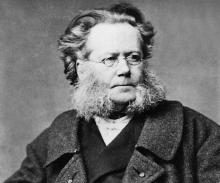“There is still much to be done in this country before we can be said to have achieved full freedom. But our present democracy scarcely has the power to accomplish that task. An element of nobility must enter into our political life, our government, out members of parliament and our press… And this nobility, which I hope may be granted to our people, will come to us from two sources, the only two sections of society which have not as yet been corrupted by party pressure. It will come to us from our women and our working men. The reshaping of social conditions which is now being undertaken in Europe is principally concerned with the future status of the workers and of women. That is what I am hoping and waiting for, and what I shall work for, all I can.”
- Henrik Ibsen, 1885, one year before the premiere of Rosmersholm
Henrik Ibsen
Henrik Ibsen was born on March 20, 1828, in Skien, Norway. He grew up in the small Norwegian coastal town of Skien as the oldest of five children born to Knud and Marichen Ibsen. His father was a successful merchant and his mother painted, played the piano and loved to go to the theater. Ibsen himself expressed an interest in becoming an artist as well.
At 15, Ibsen stopped school and went to work. He landed a position as an apprentice in an apothecary in Grimstad. Ibsen worked there for six years, using his limited free time to write poetry and paint. In 1849, he wrote his first play Catilina, a drama written in verse modeled after one of his great influences, William Shakespeare.
Ibsen moved to Christiania (later known as Oslo) in 1850 to prepare for university examinations to study at the University of Christiania. Living in the capital, he made friends with other writers and artistic types. In 1951, Ibsen worked as a writer and manager for the Nowegian Theatre in Bergen. In 1857, Ibsen returned to Christiania to run another theater there. This proved to be a frustrating venture for him, with others claiming that he mismanaged the theater and calling for his ouster. Despite his difficulties, Ibsen found time to write Love's Comedy, a satirical look at marriage, in 1862. In the same year, he was exiled to Italy, where he wrote the tragedy Brand. In 1868, Ibsen moved to Germany, where he wrote one of his most famous works: the play A Doll's House in 1879. His next work, 1881's Ghosts, stirred up even more controversy by tackling such topics as incest and venereal disease. The outcry was so strong that the play wasn't performed widely until two years later.
In Rosmersholm (1886), Ibsen returned to tragedy, but he continued his experimenting with leaving certain basic facts of the play undefined and developed it to such an extreme that most of the defining phenomena of the play’s world are not given precise definition. Michael Meyer, Ibsen’s English biographer, rightly notes that Rosmersholm is Ibsen’s “most inexhaustible” play, and Freud found it sufficiently worthy of his attention to include a discussion of the play’s female protagonist, Rebecca West, in an essay on “character-types.” As many have noted, Rosmersholm is also Ibsen’s most beautifully designed play.
In 1900, Ibsen had a series of strokes that left him unable to write. He managed to live for several more years, but he was not fully present during much of this time. Ibsen died on May 23, 1906. His last words were "To the contrary!" in Norwegian. Considered a literary titan at the time of his passing, he received a state funeral from the Norwegian government.
B. (2019, November 06). Henrik Ibsen. Retrieved April 27, 2021, from https://www.biography.com/writer/henrik-ibsen
Van Laan, T. (n.d.). Life and works. Retrieved April 27, 2021, from https://ibsensociety.org/ibsen-life-and-works/

